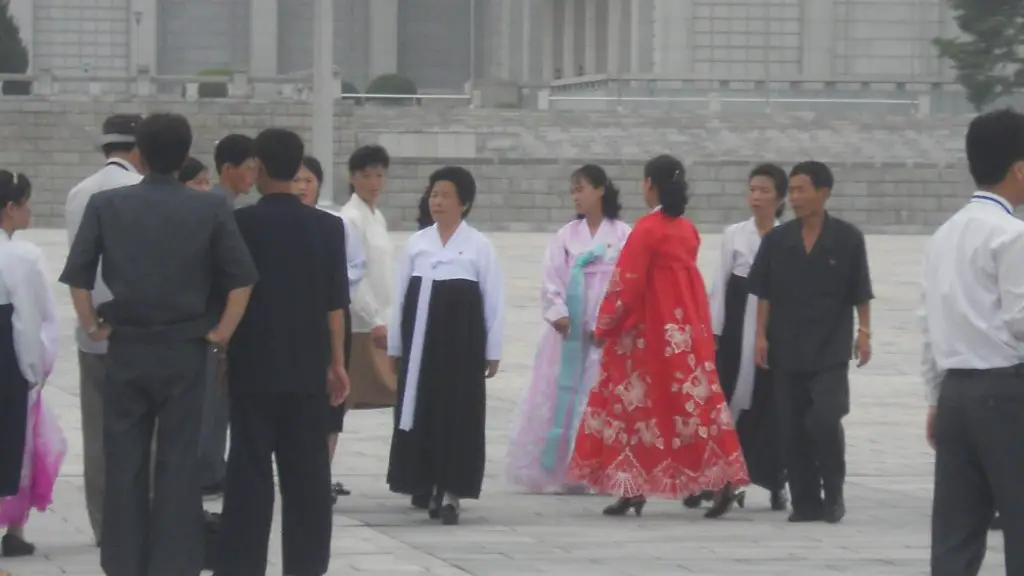Introduction
The relationship between the US and North Korea has been complex and ever-evolving, so it’s not surprising that the two countries are seen as enemies today. For decades, tensions have periodically risen and subsided, leading to a de facto stalemate that has seen both sides adopt an increasingly hostile stance. In recent times, the US has imposed economic sanctions on North Korea, while North Korea has stepped up its nuclear weapons program, raising fears of a potential conflict.
Global Security
The main reason why the US and North Korea are enemies is global security. For the US, North Korea’s ongoing nuclear weapons program is seen as a potential threat, since it could allow the country to strike US targets. As a result, the US has adopted a hostile stance towards North Korea, imposing economic sanctions on the country and engaging in military exercises in the region to deter North Korea from developing its nuclear capability.
At the same time, North Korea views the US as an imperialist power that seeks to contain its power. As a result, the country has developed a nuclear weapons program to ensure its own protection. In spite of this, North Korea has had little success in its efforts to become a global superpower, and the US remains the primary target of its nuclear ambitions.
Economic Sanctions
Another major factor in why the US and North Korea are enemies is the imposition of economic sanctions. The US has applied a range of economic sanctions on North Korea in an attempt to force the country to abandon its nuclear weapons program. In 2017, the US imposed its toughest set of sanctions on North Korea, which prohibit the sale of oil and other products to the country and bar foreign banks and businesses from doing business with North Korea.
This has led to an escalation in tensions between the US and North Korea, as the latter feels the economic pressure of the sanctions and is increasingly determined to pursue its nuclear ambitions. North Korea has also responded to the sanctions by launching a series of missile tests and increasing its other military capabilities.
Cultural Differences
Finally, cultural differences between the US and North Korea are another reason why the two countries are enemies. For decades, the US has labelled North Korea as a rogue state, representing the most extreme form of totalitarianism and human rights abuses. The US has also alleged that the North Korean government has used political prisoners for forced labor and denied basic freedoms to its citizens.
At the same time, North Korea views the US as a imperialist power that seeks to contain its power. This is reflected in the way that North Korean media routinely disparages the US and its leaders, often targeting former President Obama as a prime example of American aggression.
Military Force
Military force is another major factor that has driven the US and North Korea to become enemies. In recent years, the US has engaged in a series of military exercises in the region, including joint training operations with South Korea. These exercises are designed to deter North Korea from pursuing its nuclear ambitions and to show the US is willing to use military force if necessary.
North Korea, however, perceives these military exercises as an act of aggression and has responded with its own military capabilities, including missile tests and other military drills. As a result, the US and North Korea are locked in a stalemate, with each side unwilling to compromise and reluctance from both sides to define their military strategies.
Impact On The Region
The relationship between the US and North Korea has had a profound impact on the wider region. The hostilities between the two countries has led to heightened tensions in East Asia, as countries such as South Korea, Japan, and China fear that a conflict between the US and North Korea could draw them into the fray.
Moreover, the US’s economic sanctions on North Korea have exacerbated the country’s humanitarian crisis. In 2017, the UN reported that North Korea was facing a severe food shortage and estimated that millions of people were facing severe malnutrition due to the sanctions.
Global Dialogue
The nuclear tensions between the US and North Korea have also cast a pall over international relations, with other countries seeking to play a role in the situation. As a result, global dialogue has increased in recent years, with countries such as China, Russia, and South Korea engaging in negotiations with North Korea in an attempt to de-escalate tensions.
Likewise, the US has also engaged in back-channel diplomacy with North Korea, although with limited success. Nevertheless, the US has indicated that it is willing to negotiate with North Korea if the country is willing to meet certain conditions, including the complete denuclearization of the Korean Peninsula.
Effect On US Foreign Policy
The US’s relationship with North Korea has also had an impact on its foreign policy in the region. In recent years, the US has adopted a more hostile stance towards North Korea, and the situation has been a major driver of US policy in the region. The US has also become increasingly focused on containing North Korean aggression and ensuring the security of countries in the region.
In addition, the US has sought to use economic sanctions and diplomatic pathways to pressure North Korea into abandoning its nuclear ambitions. However, these attempts have had limited success so far, and the US appears to be set for a prolonged battle with North Korea.
Ongoing Tensions
In conclusion, the tensions between the US and North Korea are likely to remain for the foreseeable future. The US is committed to containing North Korea’s nuclear ambitions and is unlikely to back down or loosen its economic sanctions. North Korea, meanwhile, is determined to protect its autonomy and will continue to pursue its nuclear ambitions in spite of US pressure.
As such, it seems unlikely that US and North Korea will resolve their differences anytime soon and it is likely that tensions between the two countries will remain in the years ahead.




